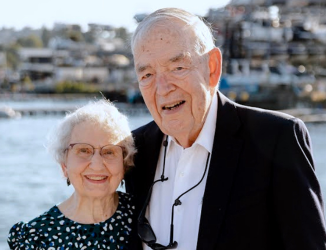When Hearts Break: Unraveling the Mystery of 'Broken Heart Syndrome'
In August 2023, Andy Smallman’s mother, Carib, was rushed to Overlake’s ER after experiencing severe chest pain and shortness of breath. Andy says the unexpected trip to the ER had come just nine days after his father, Al, had passed away. The loss of Carib’s husband of nearly 65 years had taken its toll—both emotionally and physically.

First, let me preface this post by saying that my mom is fine and after a night in the hospital is back home, resting comfortably.
Everybody good? Okay, then…
Yesterday morning, my brothers and I received a text from our mom that said, “Having a bad morning physically after a bad night. Think it’s a food reaction but it isn’t going away. I really don’t want to call 911. Keep you posted.”
I immediately called her and after she described chest pains and tightness of breath, we agreed she should call 911. I had just arrived at work so I quickly packed up my stuff and returned to my car. It was going to be a slow drive from Northgate to Mercer Island at 8:30 a.m., so I knew I had better get going.
As I was crossing the I-90 Floating Bridge from Seattle to Mercer Island, my cell phone rang and the caller ID indicated it was my mom calling. It wasn’t. It was a paramedic who said, “Your mom is having a heart attack. Instead of coming to her place, meet us at the ER at Overlake Medical Center.”
Simple enough to do physically. A little more challenging mentally.
Upon arriving at the ER, I saw four or five people attending to my mom, inserting lines, changing her into a hospital gown, speaking with reassuring tones, but acting with the utmost urgency. Within a couple of minutes, Dr. Ronnier Aviles arrived who explained to us both, “Okay, you’re having a heart attack and what we need to do is called an angiogram.”
As he’s explaining this, another person arrives with consent paperwork and a pen. He is holding the form over my mom as Dr. Aviles continued, “We’re going to insert a catheter into an artery, either through your wrist or your groin, to see what’s happening in your heart. There is a 1 in 1000 chance of something bad happening during this procedure, a stroke, or a heart attack, or the artery may break.”
Let me say that that’s a lot to take in. But he wasn’t done, “If we discover a blockage, we’ll be able to do an angioplasty and hopefully clear it. But there is a 1 in 100 chance of something bad happening during this procedure. But it’s much riskier to do nothing.”
My mom turned to me, “What do you think I should do?”
“I think you should have the procedure.”
At that point, the pen was placed in her hand and she signed the form. Almost immediately, her gurney was moved from the ER to the Cardiac, Stroke, & Telemetry Unit. I hurried along after her, walk-jogging with Dr. Aviles, carrying my mom’s purse. Dr. Aviles told me she was in good hands, then took me to a waiting room with these words, “While the procedure is pretty quick, please don’t assume the worst if I’m not back out to update you for a little while. No news is good news.”
I sat down, updated my brothers and others via text, and wondered what a person is supposed to think about at times like these.
Just before my brother, Scott, arrived, Dr. Amy Cheney came out and invited me to sit down (is that good or bad when you’re invited to sit down?). She said, “We didn’t find any blockages; in fact, I hope I have the coronary arteries your mom has when I’m 90.”
Exhale.
“What we think your mom is experiencing is something called ‘broken heart syndrome.’ It’s when a person has recently experienced a significant loss or some other kind of trauma and it impacts their heart. We’re going to admit her for observation. Sometimes patients with this condition need medications and careful monitoring, but most likely she will be just fine. I would estimate one to two nights in the hospital.”
It turned out to be one night.
Contributed by Andy Smallman. A version of this story first appeared on Andy’s personal blog, Andy Smallman – Promoting connection & warmth.
Broken heart syndrome, also known as takotsubo cardiomyopathy (TCM), is generally a short-term (temporary) type of heart condition. It can be triggered by an intense emotional or physical stress. It causes sudden chest pain and/or shortness of breath. The symptoms of TCM can look like a heart attack. Learn more about TCM symptoms, who is at risk, and how it is diagnosed and treated.
As the most advanced center of its kind on the Eastside, Overlake's David and Shelley Hovind Heart & Vascular Center offers a full range of resources for the prevention, early detection, rapid treatment, and rehabilitation of heart and vascular diseases.










